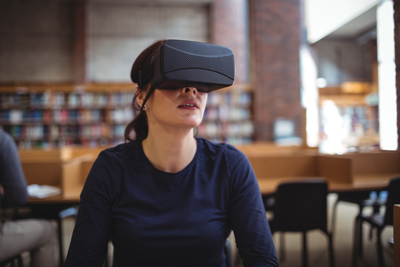
Anthony Hié, Chief Digital Officer at Excelia
The Metaverse is not a ‘gadget’, or indeed the stuff of science fiction. In fact, many studies show that it can actually improve learning capacity!
This is why we are convinced that, from now on, pedagogy needs to be designed with this new tool in mind and that this virtual world offers significant benefits for our learners.
How does neuroscience relate to the Metaverse? Why will the Metaverse become a valuable technological tool for learning? How are we going to adapt our pedagogical approach at Excelia?
-
What does Cognitive Science teach us ?
Neuroscience studies the cognitive and emotional processes in our brains, which are themselves closely linked to learning processes. In three succinct points, here is what Cognitive Science has to say on the subject of education :
-
Attention and Memory… these are closely linked in learning. Attention allows us to select information and Memory is the next step, which will store it in our brain. Attention is therefore an essential component, the key to learning.
-
Our brain does not only memorise the information learnt during a lesson, but also stores the emotions felt. This means that we retain what we have seen, heard, and felt. Among the information transmitted to the brain, the emotions felt have a major impact on our ability to memorise. When we feel emotions during a lesson, we are more likely to retain the information.
-
The more learning experiences, learning formats and learning contexts we have, the more we develop our capacity for abstraction, agility and overall performance.
As a school of higher education, our role is to be aware of these findings, to understand them, to incorporate them into our approach in order to make the right choices, and to adapt and improve the different pedagogical opportunities available. These considerations have but one objective: to facilitate student learning whilst improving the educational experience.
-
So, in practical terms, how can the Metaverse, as a virtual world, facilitate learning ?
- By having access to immersive virtual worlds in three dimensions with their 3D headset or glasses, learners leave behind all their usual distractions such as telephones, music, background noises, etc. They are therefore highly focussed, and this improves, maximises or stimulates their level of concentration.
- Unlike a formal lecture, the Metaverse is designed as an environment where learners are actively involved, which makes for more effective and efficient learning.
- By learning for themselves, students are actors in their own learning process, which makes it easier and more effective for them to assimilate concepts and to do so in a more stimulating way.
- Also, by making decisions themselves in the exercises offered in the Metaverse, students develop skills of adaptability and abstraction, which are very valuable in the workplace today.
- Immersion can generate more interest and enjoyment for some learners than a lecture, especially among the younger generations. We know that if you’re enjoying yourself, learning becomes easier and more productive.
- The use of multimedia in the learning process is very effective. We learn best in a world where words, images, graphics, and voices are presented simultaneously.
The benefits of the Metaverse for learners appear to be numerous:
- The Metaverse engenders more emotions in learners. By offering students unusual experiences that they don’t have in the real world, the Metaverse generates new emotions that help them remember.
- The Metaverse arouses curiosity. Learners enjoy experiences that are so rich and varied, helping to develop their curiosity, which is a veritable key to learning.
- Learners gain in confidence. In simulated environments, through their avatar, learners take more chances, even at the risk of making mistakes. By taking responsibility for their choices, they gain in self- confidence.
- Boldness is encouraged. To solve the problems presented in the Metaverse exercises, students will make bolder, more creative choices than in real life.
- Learners develop new skills that would be difficult to acquire in the real world. Each new immersive experience is an opportunity to develop new competencies, both in terms of savoir-faire and Soft Skills.
- Learners feel less stressed and anxious in a virtual world. The entertaining and lively nature of the Metaverse reduces stress and anxiety levels of learners, as judgment by others doesn’t exist.
- Mistakes are seen as a valuable lesson for learning and not as a failure. This is a real revolution in the world of education… any mistakes made during experiences in the virtual world will not be considered by teachers as a failure, but rather as a logical step towards improvement.
At Excelia, the idea behind our Metaverse is to combine neuroeducation and technology so as to ensure effective and meaningful pedagogy.

Experiential learning in an immersive world maximises and stimulates the cognitive abilities of each individual. At Excelia, we are convinced that the Metaverse is a learning tool, like any other, that must be integrated into our teaching approach. It will of course mean that our teaching practices evolve. It will be possible in the Metaverse to engage students in immersive learning experiences, that is to say ‘Learning through experimentation’.
In this way, pedagogy is no longer passive, like in lectures, but rather ‘active’, helping contribute to a greater retention of knowledge.
Our new label, ILE® (Immersive Learning Experience), an unprecedented approach in higher education, is Excelia’s trademark of excellence. It aims to guarantee the quality of immersive educational experiences, whether on campus or in the Metaverse. It is the mark of a bold exploration of innovative educational approaches based on neuroeducation. The systems developed under the ILE® label guarantee the effectiveness of immersive learning. Based on the link between learning and emotions, ILE® is also an approach that avoids the pitfall of neuro-myths, which are inaccurate beliefs about the functioning of the human brain.
This innovative and immersive approach can draw on neuroeducation and technology to create learning experiences that maximise knowledge retention».
Anthony Hié, Chief Digital Officer at Excelia
In order to successfully incorporate the Metaverse into education in a constructive, meaningful and sustainable way, the questions we need to ask ourselves are manifold and affect our entire ecosystem. What are the worthwhile skills to be learned in the Metaverse ? How does the Metaverse relate to the physical on-campus experience ? How do we get Faculty to embrace this new way of teaching ?
All these questions are answered in the following articles :
Discover our article "Why the place of Humans in the Excelia Metaverse is crucial !"
I return to the Metaverse page





